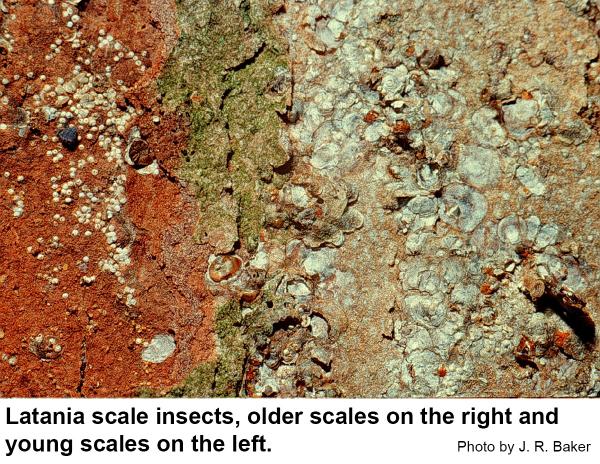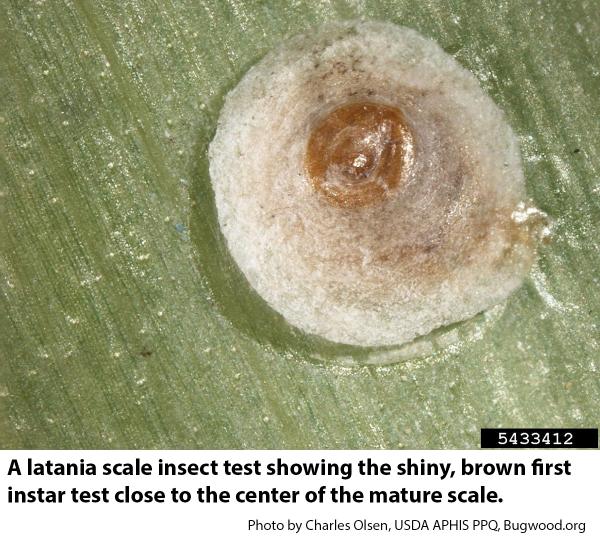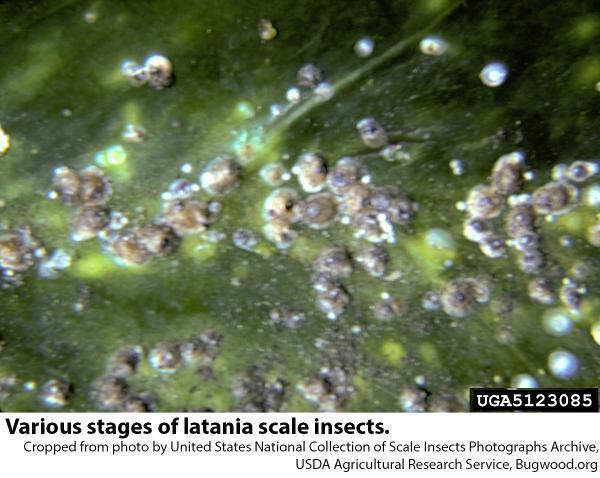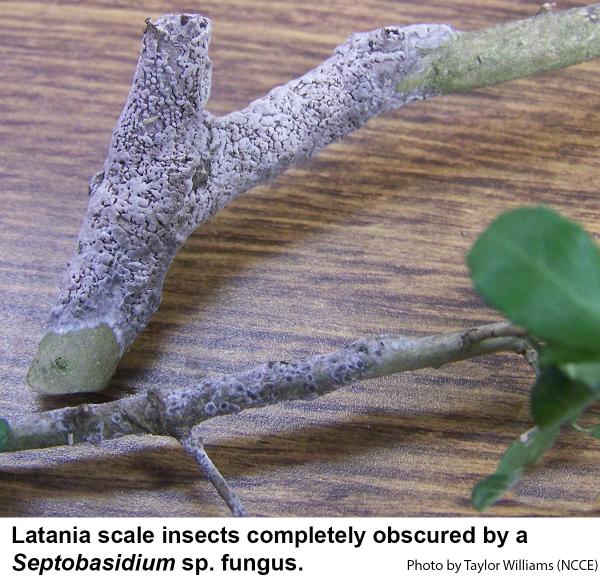Description and Biology
Latania scales, Hemiberlesia lataniae, are small insects covered by a circular, tan to gray, papery "scale" (test or armor). The first instar scale test remains more or less in the center of the mature armor. Crawlers hatch from yellow eggs within a few hours after they have been laid. Crawlers (first-stage nymphs) usually do not migrate far from the parent insect. Crawlers usually settle within eight hours, insert their thread-like mouthparts to feed, and immediately begin secreting wax that becomes their armor. Lataniia scale insects enlarge their armor as they molt and grow. Once they settle down, latania scales do not move again, so the only noticeable external change that takes place is the gradual expansion of the scale covering. These scales mature and beging laying eggs in about two months. Latania scale insects may be infected by a Septobasidium fungus that protects these insects from parasites and predators, although infected scales themselves may be stunted.
Host Plants
Latania scale insects have been found on over 160 host plants including hollies, hummingbird bush, canna lilies, and even gladiolus corms. The scale usually occurs on branches and twigs, but as an infestation increases, it may also be found on the leaves and and even fruit. Smaller branches may be killed by a heavy infestation.
Residential Recommendations
The tiny aphelinid wasp, Aphytis diaspidis, is a relatively common parasite of armored scale insects and it may be the major reason that latania scale is not more common and damaging in North Carolina. The twice-stabbed ladybird beetle, Chilocorus stigma, also feeds on latania scale as well as other scale insects. In case these natural enemies fail to control latania scales adequately, it is fortunate these scales are not particularly resistant to insecticides. Horticultural oils should give adequate control. Apply a horticultural oil on the next convenient day and then apply it again two weeks later to kill any new scales which may have been in the egg stage during the first treatment. Use a 2% rate for the oil during the growing season in order to avoid damaging the plants. During the winter, most plants are tolerant of the “dormant oil” rate (usually 4%). If the plant/scales are infested with a Septobasidium sp. fungus, spraying oil may help to loosen the Septobasidium fungus as horticultural oils are also somewhat fungicidal.
References
- Chilocorus stigma (Say) (Coleoptera: Coccinellidae), Twice-stabbed ladybeetle. Fondren, K. no date, after 1999. Biological Control, A Guide to Natural Enemies in North America.
- Armored Scale Identification and Management on Ornamental Plants. Frank, S. 2010. Entomology Insect Notes, NC State Extension Publications.
- Life History and Control of Latania Scale on Avocado. McKenzie, H. L. 1935. California Avocado Association 1935 Yearbook 20: 80-86.
- The Felt Fungus, Septobasidium. McRitchie, J. J. 1991. Plant Pathology Circular No. 346. Fla. Dept. Agric. & Consumer Serv.
- Extension Plant Pathology Publications and Factsheets
- Horticultural Science Publications
- North Carolina Agricultural Chemicals Manual
For assistance with a specific problem, contact your local N.C. Cooperative Extension Center.
This Factsheet has not been peer reviewed.
Publication date: April 22, 2015
Reviewed/Revised: Nov. 22, 2024
Recommendations for the use of agricultural chemicals are included in this publication as a convenience to the reader. The use of brand names and any mention or listing of commercial products or services in this publication does not imply endorsement by NC State University or N.C. A&T State University nor discrimination against similar products or services not mentioned. Individuals who use agricultural chemicals are responsible for ensuring that the intended use complies with current regulations and conforms to the product label. Be sure to obtain current information about usage regulations and examine a current product label before applying any chemical. For assistance, contact your local N.C. Cooperative Extension county center.
N.C. Cooperative Extension prohibits discrimination and harassment regardless of age, color, disability, family and marital status, gender identity, national origin, political beliefs, race, religion, sex (including pregnancy), sexual orientation and veteran status.




